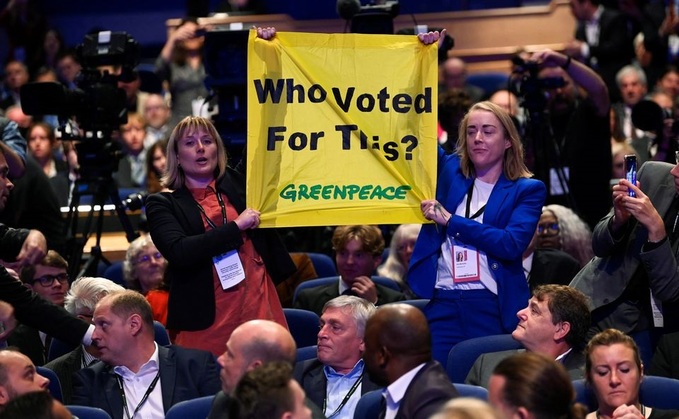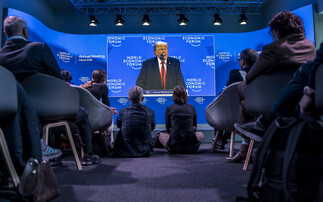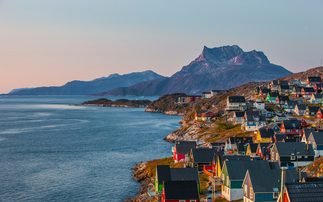
Credit: Greenpeace
The Truss administration wants to label the environmental movement as part of the ‘anti-growth coalition’, but it is the green economy and a pro-active state that holds the key to sustainable growth
'Growth, growth, and growth'. It is, not to put too fine a point on it, a terrible political slogan. Abstract, indistinct, and drawing attention to the glaring economic failure of the past 12 years of Conservative government.
Liz Truss' attempt this week to position her government as the standard bearers of economic growth, bravely standing up to the nefarious forces of the 'anti-growth coalition' is a classic 'enemies of the people' style attempt at populist division, lumping together "Labour, the Lib Dems and the SNP, the militant unions, the vested interests dressed up as think-tanks, the talking heads, the Brexit deniers, Extinction Rebellion" with anyone else who disagrees with the government so as to brand them all as enemies of prosperity.
But as with so much of the new government's agenda it is guilty of over-reaching. As the FT's Jim Pickard noted, it is "ludicrous to argue that anyone who doesn't support your particular economic plan must somehow be anti-growth - if you don't use *my* cake recipe you must be anti-cake".
Of all the anti-growth agitators listed by Truss only Extinction Rebellion could reasonably described as being opposed to growth, and even they are often simply in favour of a different, better kind of growth. Moreover, as I've argued many times before, if the economy is not growing is it not more likely to be the fault of those in actual power than the naughty scamps with placards?
As for the rest of the 'anti-growth coalition', Truss' focus on growth allows the opposition to fight on a territory it would happily choose and offers a daily reminder that the most powerful members of the anti-growth coalition are to be found on the government's own benches. The biggest drag on growth currently is to be found in the form of flatlining productivity, crumbling infrastructure, lengthening NHS waiting lists, soaring mortgage repayments, inefficient homes, nimby MPs, a hard Brexit deal that is set to knock four per cent of GDP, and a Prime Minister who genuinely abhors the sight of solar farms on under-productive agricultural land. Responsibility for all these barriers to growth and many more can be reasonably laid at the door of the Conservative government.
However, the biggest problem with Liz Truss' growth plan is to be found not in its ham-fisted political positioning, but in the fundamental inconsistency between the government's ideological impulses and its stated goals. The plan won't work. And it won't work because it completely misunderstands how modern business and modern economies succeed.
Nowhere is this incoherence better illustrated than in the government's confused approach to the green economy.
One of the few industrial success stories of the past decade has been provided by the offshore wind sector where a combination of direct funding, competitive subsidy auctions, and stable regulatory frameworks has served to drive regional investment, create jobs, and slash costs and emissions. Similarly, just before Liz Truss' speech this week, the UK auto industry confirmed it had sold its millionth plug-in vehicle, again underlining how it is electric vehicles that have provided the only bright spot for the sector over the past few years.
Everywhere you look in the green economy it is the same story. Study after study demonstrates how a national energy efficiency upgrade programme and zero carbon home building blitz delivers a better return on investment than any other infrastructure programme. Onshore renewables projects provide the cheapest and quickest form of new power capacity. Hydrogen, CCS, battery, smart grid, and nuclear projects are all in the pipeline or ready to go, providing a route for long term industrial competitiveness, energy security, and job creation. Public transport, mobile, and broadband connectivity boast enormous potential to unlock rural and regional productivity. Regenerative agriculture and negative emissions projects provide a means of bolstering climate resilience and food security.
These projects and thousands more like them would not only drive economic growth, but they would drive the right sort of economic growth. Growth that would be sustainable in every sense of the word, unlocking huge co-benefits through improved health, enhanced energy security, greater energy efficiency (or should we call it energy productivity?), better climate resilience, and increased competitiveness and export potential.
The Truss administration insists it remains supportive of this agenda. But its initial focus on taking office has been on pursuing a fracking revolution that will never happen and ordering yet another review of net zero, environmental rules, and farming subsidies that will burn through at least one per cent of the available time to meet the UK's climate targets and potentially result in the sacrificing of crucial policies on the altar of small state ideological purity. A government that has promised to prioritise growth is deferring and diluting decisions that could help drive rapid growth with near immediate effect.
Meanwhile, at both the practical and the ideological level Truss' growth plan is as likely to hamper growth as it is to stimulate it.
Kwasi Kwarteng's fiscal irresponsibility fuels market instability and pushes up interest rates, driving up the cost of the capital investments that are essential for both driving growth and delivering on the UK's net zero goals. At the same time, the ideological disconnect between what the bleak economic and security situation requires and the Prime Minister's impulses further undermines growth prospects. To take just one example, the only reason the UK is refusing to emulate its neighbours and call on the public to save energy in response to the very real risk of blackouts this winter is found in Truss' insistence that she is "not going to tell you what to do".
It is worth underpacking the ideology behind Number 10's reported decision to block plans for a modestly funded £15m public information campaign to encourage people to save energy this winter. The Prime Minister has decided that households should be completely free to use as much energy as they choose even if it means we all suffer blackouts. It is 'there is no such thing as society' as policy choice. The only thing that will be allowed to encourage people to use less energy will be the price signal, except that price signal has been drastically diluted by a government intervention that will cost the taxpayer up to £150bn. The whole sorry mess is as ideologically incoherent as it is economically and politically nonsensical.
It is also important to stress how all of the UK's allies and competitors, as well as the vast majority of the business community, now understand that government has a central role to play in driving sustainable economic growth. The EU and US response to the global energy crunch has been to visibly double down on the net zero transition and rapidly adopt policies and public spending that will mobilise multi-billion dollar investments in low carbon infrastructure. China continues to quietly accelerate its renewables and EV revolution. Even Singapore is not the libertarian fever dream it is painted out to be.
Meanwhile, everyone from the CBI to the IMF to the boss of Shell implores the government to fast track the net zero policies, effective regulations, and windfall taxes that can simultaneously drive growth, enhance energy security, and slash emissions.
Earlier this week one of the Institute of Economic Affairs' apparatchiks, Kristian Niemietz published a revelatory twitter thread in which he argued that the "downfall of Trussism and Kwartengism" was the result of the leftward drift of elite opinion. "In the past, you might have expected those people to be quite sympathetic to a Truss-Kwarteng agenda," he argued. "Truss and Kwarteng are broadly economically liberal, but there's nothing Ukippy-Gammony about them. They might describe themselves in terms that FT/Economist/Times readers like. The trouble is that those people only have skin-deep convictions. They're obsessed with 'respectability'. They'll always adopt the opinions that are considered 'sensible' and 'nuanced'. There was a time when economic liberalism could have ticked those boxes. That time is over… Economic liberalism has lost all Upper Normie support."
Leaving aside for a second that economic liberalism's apparent casting out by the elite has been so successful that its leading acolytes are currently Prime Minister and Chancellor and its party of choice has been in government for 12 years, there is an alternative explanation for the political and economic elites' apparent disengagement from economic liberalism which Niemietz and his Tufton Street allies refuse to consider: it doesn't work anymore, if it ever did.
Elite opinion is shifting, not because it is shallow and obsessed with the zeitgeist, but because reality has shifted. The climate crisis is real, as is the remarkable competitiveness of clean technologies, and the threat to democracy from populism and authoritarianism. Market forces can help, but they can only do so much in response to these challenges. The combination of polluting externalities and the risk of free riders in the industrial transition means governments are required to catalyse investment in public goods, set effective market rules, and police them. True economic liberals used to understand this, until libertarianism made too many of them forget it. The problem with libertarianism is you eventually run out of biosphere to despoil.
This does not mean only left-wing governments can now deliver economic growth and effective climate action. Far from it. There are plenty of centre-right, market-led policies that can help drive green growth and accelerate the net zero transition. But raw libertarianism of the kind favoured by many of Truss' allies and advisors is incompatible with modern sustainable economic growth. You can't fund tax cuts on the never-never, you can't deregulate regulations that have already been removed, you can't cut state apparatus that is already on its knees, you can't decarbonise while digging up ever more oil and gas. It is a recipe for instability and suffering. It will fail on its own terms.
The IMF, the International Energy Agency, the UN, the world's top financial institutions, pretty much every leading corporate on the planet, these organisations are not advocating for a green growth path enabled by a proactive government because they have become a 'woke' arm of Greenpeace, but because it is what proven economic and physical reality dictates as the most sensible course of action. Elite opinion used to support colonialism, workhouses, and a whole lot more besides. Times change. The fast-dawning reality is that libertarianism and its shrink the state impulses are fundamentally ill suited to the needs of the 21st century, whatever social media edge lords and demagogic Republicans say to the contrary. Truss' preferred approach to any and all challenges is just not compatible with an era of climatic instability, rapid industrial transformation, and great power geopolitics
The government is right to go for growth, growth, and growth. The problem is that like the rest of its political operation, its preferred growth model looks doomed to failure.
A version of this article first appeared as part of BusinessGreen's Overnight Briefing email, which is available to all BusinessGreen Members.










